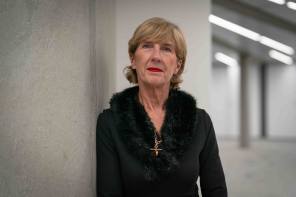

She said: “It takes time for these things to change and people have to go in order for spaces to be made available for women to take up, and sometimes people don’t want to go.”
She has been quite active in looking at the position of women and girls, but mainly in Hong Kong, where she was an an ex-pat for 16 years, over the time of the 1997 handover.
During her time there, she was a founding member of a board that looked into the situation of women and girls in Hong Kong. She said: “If you look at law, I would guess there were more women graduating from Hong Kong universities than there were men, but there were many more male partners than there were female.”
She actually found that the situation in general was not too bad for women in Hong Kong, but education was, understandably, an important factor.
For example, the office where she worked, Schroders, was 70 per cent female, some of whom were Hong Kong Chinese. “Senior fund managers, head of legal, head of compliance – were all female, and the chief investment officer for part of the time [I was there] was a woman.
“Hong Kong was a great place to work as a woman, and there were a lot of opportunities. I had both my children there, and affordable childcare makes a whole lot of difference, as well as commuting times. If you have to go to your child’s Christmas play, and if you’re in London, that means taking the whole day off. In Hong Kong I was able to get there in half an hour and just take three hours off for the afternoon.”
Ms Scott worked for Schroders looking after its Hong Kong clients, largely looking after institutional clients, but before that she worked as both a fund manager and analyst on investment trusts, investing in US equities for Standard Life and Edinburgh Fund Managers.
Now she is chairmain of the ICGF, which has assets under management of around £120m, and she is a non-executive director of Allianz Technology, Dunedin Income Growth, Fidelity China Special Situations and Pacific Horizon.
The ICGF is dedicated solely to investing in India, particularly small and mid-caps, and like its rivals Aberdeen New India Investment Trust and JP Morgan Indian Investment Trust, is subject to prevailing sentiment on India, especially as one accesses the fund via the stock market.
Political risk
Uncertainty over India’s elections next year, and whether Prime Minister Narendra Modi’s programme of reforms will continue, has dampened opinion on India as an investment opportunity, so that the fund is trading at a discount to net asset value (NAV) of 17 per cent.
But it is this volatility that makes using an investment trust suitable for investors, said Ms Scott. She said: “If you’re the fund manager of an investment trust portfolio, it’s nice to know what you have. You have a pot of money that’s not going to move and you can take a much longer term view on the investment case.
“With open-ended funds, money can flow in very easily and flow out very easily, and it’s very difficult for a fund manager to manage those funds. [When there are redemptions] you often have to sell the stocks you really love – with open-ended, you have to find the cash.”
In a volatile area such as India, an investment trust’s share price will move, but the underlying assets remain intact, she added.
There is also the key point that the ICGF invests in small caps, which she sees as benefiting from the growing consumer economy – a country of 1.3bn people with a developing middle class is wanting to spend more money on domestic items, a sector served by the small and mid-cap sector.
And many of these firms are reverting to the domestic economy, in expectation of the projected gross domestic product growth of 7.3 per cent this year and more the next. The concerns over corruption are much bigger with the large state-owned companies than the smaller scale business the fund invests in.
The rebased NAV is up 173 per cent over the past five years, although down 2.27 per cent over the past year. It has been underperforming its benchmark, the Bombay Stock Exchange Mid-Cap for the past two years, although before that it was more or less in line.
Ms Scott’s role as chairman of the board is an easier task than on an open-ended fund, in some ways. She said: “We’re holding the fund manager to account and that’s clearly a very important role of the board to do that, and to review the performance on a quarterly basis. We look at performance relative to benchmark in absolute terms and relative to peer group.
“I think we’re closer to our shareholders than perhaps the board of a unit trust might be, and if you’re on the board of a unit trust shareholder, you’re responsible for a family of funds. Our only interest is in ICGF.
“I’ve been to visit large shareholders, to see how they see their trust, and see all sorts of aspects of performance and just to understand what their views are. You don’t often get that opportunity if you’re sitting further away.”
Melanie Tringham is deputy features editor of Financial Adviser and FTAdviser.com



